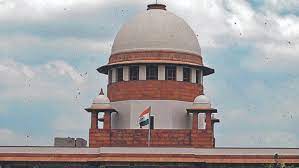Out of the ten accused persons before the Court of Sessions, six were convicted for the offences under Sections 148, 201/149 and 302/149 of the Indian Penal Code1 and separate punishment for each of the offences was prescribed, the maximum being imprisonment for life with a fine of Rs.5,000/- and in default thereof, to undergo further imprisonment of six 1 Hereinafter referred to as “IPC” months under Section 302/149 IPC. The said conviction and sentence has been set aside by the High Court vide impugned judgment and order dated 20.11.2008. (Para 2)
The sole submission of the learned counsel for the appellant is that in matters where the accused persons are convicted and sentenced by the trial court, the appellate court is normally slow in upsetting the conviction, more particularly in the light of the evidence on record, especially, that of the eyewitness (complainant). (Para 4)
The appellant/complainant (PW-9) happened to be the sole eyewitness but he had neither seen anyone killing his son Kishan Sarup nor he had deposed that he had seen anyone burning the victim Kishan Sarup. Therefore, he is not actually an eyewitness either to the killing or to the burning of the deceased Kishan Sarup (Para 9)
It may not be out of context to mention that the appellant/complainant, a sole eyewitness, happens to be the most interested witness being the father of the deceased and having long enmity with the group to which the accused persons belong, therefore, his testimony was to be examined with great caution and the High Court was justified in doing so and in doubting it so as to uphold the conviction on his solitary evidence. (Para 13)
The prosecution in this case has failed to prove the guilt of the accused both by circumstantial evidence and by means of evidence of the eyewitness. In respect of circumstantial evidence, the chain of events is not complete whereas the presence of eyewitness is also doubtful. Thus, we are of the opinion that the view taken by the High Court in extending the benefit of doubt to the accused persons appears to be the most plausible view. (Para 14)
SUPREME COURT OF INDIA
2023 STPL(Web) 478 SC
[2023 INSC 1072]
Chhote Lal Vs. Rohtash & Ors.
Criminal Appeal No. 2490 of 2014-Decided on 14-12-2023
https://stpllaw.in/wp-content/uploads/2024/01/2023-STPLWeb-478-SC.pdf







